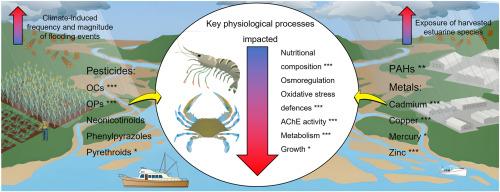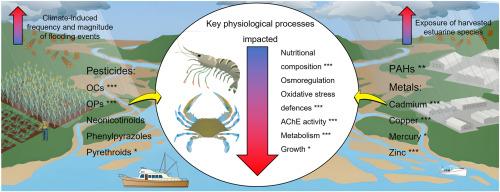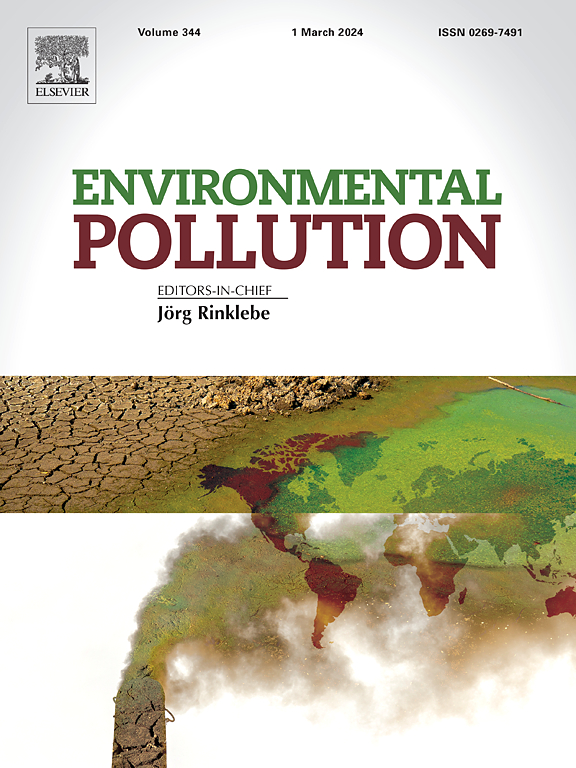Effects of contaminants and flooding on the physiology of harvested estuarine decapod crustaceans: A global review and meta-analysis
IF 7.6
2区 环境科学与生态学
Q1 ENVIRONMENTAL SCIENCES
引用次数: 0
Abstract
Contaminants are transported into estuaries during rainfall events, impacting the physiology of harvested species, and thereby threatening fisheries sustainability. Decapods are among the most economically important groups harvested from estuaries, but are at high risk of contaminant exposure. We conducted a systematic review and meta-analysis evaluating the physiological responses of harvested estuarine decapods to contaminants and flooding. A total of 138 research articles were identified, with global research efforts corresponding to the geographic distribution of crustacean harvesting. From these studies, 305 acute toxicity values for metals, polcyclic aromatic hydrocarbons (PAHs) and pesticide chemical classes were extracted and 341 sublethal effect sizes (log-response ratios; LnRRs) calculated using 91 physiological measures across seven response categories. At sublethal environmentally relevant concentrations, exposure to various metals, pesticide chemical classes and PAHs consistently elicited negative effects on decapod physiology (LnRR range: −0.67 to −0.07). Key physiological processes impacted by contaminant exposure included nutritional condition, osmoregulation, oxidative stress defences, acetylcholinesterase activity, metabolism and growth (LnRR range: −0.73 to −0.10), with a general trend for greater effects later in ontogeny. With new agricultural and industrial chemicals continually being marketed, our meta-analysis highlights the need for regulatory testing on harvested species prior to registration for use in catchment areas. Under future climatic variability, harvested estuarine decapods may be increasingly exposed to contaminants, with implications for fisheries and global food security.


污染物和洪水对收获的河口十足目甲壳类动物生理机能的影响:全球回顾与荟萃分析
污染物会在降雨过程中进入河口,影响捕捞物种的生理机能,从而威胁渔业的可持续性。十足类甲壳动物是从河口捕捞的最重要的经济鱼类之一,但接触污染物的风险很高。我们对河口捕捞的十足类甲壳动物对污染物和洪水的生理反应进行了系统回顾和荟萃分析评估。共确定了 138 篇研究文章,全球研究工作与甲壳类捕捞的地理分布相对应。从这些研究中提取了 305 个金属和农药化学类别的急性毒性值,并使用 7 个反应类别中的 91 个生理指标计算了 341 个亚致死效应大小(对数反应比;LnRR)。在亚致死环境相关浓度下,暴露于各种金属、农药化学类别和多环芳烃会持续对十足目动物的生理产生负面影响(LnRR 范围:-0.67 至 -0.07)。受污染物影响的主要生理过程包括营养状况、渗透调节、氧化应激防御、乙酰胆碱酯酶活性、新陈代谢和生长(LnRR 范围:-0.73 至 -0.1),总体趋势是在发育后期影响更大。随着新的农业和工业化学品不断上市,我们的荟萃分析强调了在集水区注册使用之前对收获物种进行监管测试的必要性。在未来气候多变的情况下,被捕捞的河口十足目动物可能会越来越多地受到污染物的影响,从而对渔业和全球粮食安全产生影响。
本文章由计算机程序翻译,如有差异,请以英文原文为准。
求助全文
约1分钟内获得全文
求助全文
来源期刊

Environmental Pollution
环境科学-环境科学
CiteScore
16.00
自引率
6.70%
发文量
2082
审稿时长
2.9 months
期刊介绍:
Environmental Pollution is an international peer-reviewed journal that publishes high-quality research papers and review articles covering all aspects of environmental pollution and its impacts on ecosystems and human health.
Subject areas include, but are not limited to:
• Sources and occurrences of pollutants that are clearly defined and measured in environmental compartments, food and food-related items, and human bodies;
• Interlinks between contaminant exposure and biological, ecological, and human health effects, including those of climate change;
• Contaminants of emerging concerns (including but not limited to antibiotic resistant microorganisms or genes, microplastics/nanoplastics, electronic wastes, light, and noise) and/or their biological, ecological, or human health effects;
• Laboratory and field studies on the remediation/mitigation of environmental pollution via new techniques and with clear links to biological, ecological, or human health effects;
• Modeling of pollution processes, patterns, or trends that is of clear environmental and/or human health interest;
• New techniques that measure and examine environmental occurrences, transport, behavior, and effects of pollutants within the environment or the laboratory, provided that they can be clearly used to address problems within regional or global environmental compartments.
 求助内容:
求助内容: 应助结果提醒方式:
应助结果提醒方式:


